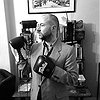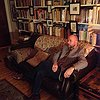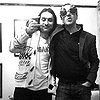Not simply a footnote
What do you personally consider to be the incisive moments and pieces in your journalistic work and/or career?
Joining The Wire was a major one. Meeting Richard Youngs in Glasgow in the early-90s was a big one, not just because I was such a fan of his music, but he had boxes of hard-to-find, underground vinyl that he was getting through Jimmy Johnson at Forced Exposure in the US. At the time it was totally unavailable in the UK and he sold me a ton of it, so it was the first time I was ever able to get my hands on stuff I had previously only read about, things like LPs by KK Null and The Dead C and Vermonster and Biota.
Another big moment was meeting the late Trevor Manwaring, he was a great friend and I got in touch with him just before I moved down to London and got a job at The Wire. He worked for Harmonia Mundi, a classical music label and distributor, and had somehow managed to talk them into distributing PSF and associated Japanese underground labels and I remember seeing an advert in The Wire listing the titles they were bringing in to the UK. I couldn’t believe it, I mean this was the early 90s, no one in the UK knew about this shit. So I called him up looking to get hold of some of this stuff and when I eventually moved to London we became fast friends and he turned me on to so much great music. He put out CDs by Derek Bailey and the Spontaneous Music Ensemble and High Rise and Fushitsusha on his Chronoscope and Paratactile labels. He funded a series of Fushitsusha recordings at Toby Robinson’s Moat Studios in London, where these days they record most of the Big Finish Doctor Who audio adventures.
Together we promoted the first Musica Transonic/Toho Sara/Mainliner tour of the UK in the mid-90s, where average audiences ranged between five to ten people. Back then there was a secret cabal of people exchanging information about Japanese underground music in London and Trevor initiated me into it. There was Trevor, myself, Kevin Martin (who went on to do Techno Animal/The Bug et al) and Edwin Pouncey (aka Savage Pencil). Between the four of us we would trade information and contacts and fliers and recordings, just pooling our knowledge about this new Japanese music. Plus we were lucky in that Alan Cummings, who also writes for The Wire, was living in Tokyo at the time and he is fluent in Japanese, so he was our point of contact and our foreign correspondent. He would drop into Modern Music, the shop run by Hideo Ikeezumi, who also ran the PSF label that released Fushitsusha and High Rise and Ghost and White Heaven et al, and he would scour the bins for us and report back on what was available. That’s how I managed to pick up original vinyl by Keiji Haino, Fushitsusha, Nijiumu, Maher Shalal Hash Baz, White Heaven et al, when there was no way of getting them domestically. It was a very exciting time.
My first book coming out was a big one, England’s Hidden Reverse, that was an important milestone, uncovering that reverse tradition was so inspiring and I’m still in love with that world, the world of Crowley and Kenneth Grant and Arthur Machen and Austin Osman Spare and Charles Sims and Stenbock and supernatural fiction and Timothy D’Arch Smith and Ralph Chubb and William Lawes and more recent passions like Denton Welch and Baron Corvo and H. A. Manhood and Arthur Calder Marshall and Peter Anson etc. I never tire of Coil, they’re still one of my all-time favourite groups, plus records like Of Ruine Or Some Blazing Starre by Current 93 or Soliloquy For Lilith by Nurse With Wound will always have a special, inviolable place in my heart.
Plus I still read a lot of magick and I love publishers like Teitan Press and Tartarus and Strange Attractor. I am especially obsessed by Charles Stansfeld Jones aka Frater Achad, who Crowley believed, for a time, was his magickal son. I’m especially interested in his relationship with Malcolm Lowry. If I could go back in time I would love to walk to Malcolm Lowry’s cabin in Dollarton in Canada in the dark in the 1940s with the poet Al Purdy and spend the night drinking and talking with Purdy and Lowry and Stan.
Then there were various stories and features that have meant a lot over the years, my cover story on the New Weird America caught that particular wave of underground USA activity right at the moment of its self-revelation. It was also a very important moment for me personally, meeting many of the musicians I had been writing about and in touch with for years for the first time, people like Jack Rose, of course my future wife, the beautiful artist and musician Heather Leigh, Tom and Christina Carter of Charalambides, Dredd Foole, Glenn Jones, Byron Coley, Marcia Bassett, Joshua Burkett, Paul Flaherty, Chris Corsano, Matt Krefting and Jessi Leigh Swenson etc.
Also my various profiles on lifers like Derek Bailey and Peter Brotzmann were big for me. I’m also really fond of things like my Invisible Jukebox with William Bennett of Whitehouse, he has one of the best quotes ever in there, which I always come back to. He says he would never describe himself as an atheist, how identifying yourself as that involves buying into some kind of relationship with the concept of God. "Is a chimp an atheist?" he asks. "I’m like the chimp", he says. And the chimp can make music. I love that.
My favourite pieces are where I’m able to capture the personality of an artist or musician or character. I’m most interested in people and how their art interacts and informs their life, so I’m proud of pieces I did on people like Peter Walker and Conrad Schnitzler. On my recent Dead C cover, who are one of my favourite groups of all time, it feels like I came close to capturing what they are like in their lives, their energy as people. I hate boring critical exegesis. You learn more from the way a person walks or how they cook a meal or what they bring up in conversation than from some prude standing at the side of a dance floor with their shirt tucked in taking notes. I’m the guy on the dance floor, with the pretty ladies, always.
For the past six years or so I have been primarily focussed on writing fiction, which has become my central practice and my main interest. I finished my first novel, The Comfort Of Women, after five years of fairly intensive daily work which was a big milestone for me and I’m very happy with it. It’s being published by Mark Pilkington’s Strange Attractors press, who are also releasing a new edition of England’s Hidden Reverse later this year. I have two more novels in the pipeline after that, The Tomb Of The Song, which is an annihilatory kabbalistic rendering of the story of a group of abysmal temporal adventurers obsessed with historical and literary subterranea, and Adieu To All Judges And Juries, which is a hallucinated oral history of a fictional music scene in Airdrie, Coatbridge and environs, which is where I grew up in the 1980s.
Also, negative factors have been inspiring too, working for IPC and writing for Melody Maker and NME was so disillusioning, it was all so horribly politically correct and was all about ticking the right boxes in terms of the qualities you noted in things. Plus it was super conservative, really, and then having gigs writing for more mainstream music magazines and newspapers, you realise that you are not employed to turn anyone onto anything new or to express a new opinion, you are simply there to repeat things that people already believe to be true, to bolster pre-established canons or to reinforce opinions that they already hold. Anything else is simply not allowed, it’s soul-destroying and it requires that you become a caricature or a cliché to survive, or more properly a cipher, just like celebrity itself. I am psychologically unable to put myself through that. There is no freedom there. As I said, thank god for The Wire.
Mainstream culture simplifies everything but alternative culture has its own orthodoxies and rules and simplifications and dos and don’ts. I prefer to steer clear of them all. I belong to no school, I abhor ideology, whether Marxist, Fascist, Capitalist, post-modern, critical, libertarian, feminist, misogynist, any ism, basically, as if any one viewpoint can explain the world. I try to exist, fully, in one moment and then the next, always new, always unique, and always accepting. I hold Marxism as a form of fundamentalism that’s every bit as rigid and flawed and mystifying and life-denying as Christianity or Islam. I don’t believe in some fantasy Utopia. I don’t need it. I’m a lover. I refuse all of these orthodoxies. But people want you to sign up and get mad when you don’t. Most people are recruiters more than experiencers. I refuse to experience the world or art through any prism but that which I have carved with my own bare hands and that I have fought for tooth and nail. And I still believe it is possible to do that, despite all of the social and cultural pressures that we are subjected to. I see it in all of the extremely personal art that I champion and so I know it is possible to create your own universe and step outside of orthodoxies, even in difficult situations. William Blake was so right when he said “I must create a system or be enslaved by another man’s”. That’s my fundamental artistic credo right there. But mostly I just like to sit back and watch the river flow.
How would you describe and rate the music scene of the city you are currently living in and how important is it in terms of what you're actually writing about?
I love Glasgow, it’s one of my favourite cities in the world and the heart and inspiration of so much of what I write about. I could never imagine myself living in another city, certainly not in the UK, it’s very romantic and beautiful and wild and has a crazy energy, all of which suits me perfectly. I like a certain wildness, I’m a rough kind of person myself, in some ways.
However, I have little interest in supporting ‘local’ talent. Although I have always boosted anything interesting that happened to take place in Glasgow, my view has always been international. I will always support what I consider to be great art no matter where it comes from. I despise that whole parochial outlook, that whole ‘it’s happening on your own doorstep man’ bullshit, the dull duty of nationalism. What’s that Bill Hicks line about it being the place where your parents happened to have sex? Exactly. I feel no responsibility whatsoever to support or help foster anything locally or internationally or anywhere. I like good art/music, no matter where it comes from, end of story.
Of course there are great things happening in Glasgow and so much good music comes through here. That wasn’t always the case though. For years during the late 90s/early 2000s I curated the Le Weekend festival in Stirling in central Scotland and I brought over artists like Fushitsusha, Patty Waters, Ghost, Kazuki Tomokawa, Kousokuya, MV & EE, Shizuka, Flaherty/Corsano, Dredd Foole & The Din, The Dead C, Jack Rose, Borbetomagus, Pelt, David S. Ware Quartet, William Parker, Arthur Doyle, The No-Neck Blues Band etc for the first time. This was well before festivals became an established platform for presenting underground music, so hopefully that set some seeds. Still, I could give a fuck. I brought over the music that I most wanted to see, end of story.
Glasgow has always had a good DIY scene with The Pastels et al and today there are great groups and musicians here like Richard Youngs, Heather Leigh, Smoke Jaguar, Andrew Paine, Ali Roberts, The Flexibles etc. There are scuzzy low-rent musical ghettoes just like everywhere else too, a really depressing bottom-of-the-barrel ‘noise’ scene etc but I steer well-clear of that stuff.
A big thing about Glasgow is that the people are in love with language, they are so creative with it and I still love overhearing conversations and continue to be inspired by the liberties they take with it and the sheer invention of it. Outside of the Hebrews, the Glaswegians are the most language-obsessed race in the world. I owe a big debt to both cultures and have been studying Hebrew for several years now. It’s almost as complex and magical as Glaswegian. It’s a love that I share with my friend Matthew Valentine. When we first met each other, on that same first trip I took to New York with my brother when we stayed at Alan Licht’s place, I met him in the record shop where he was working alongside my pal Dean Roberts, Rock-It Scientist. We immediately hit it off with our love for language and the vagaries of various sub-cultures and the endless goof potential inherent in that. Matthew is an honorary Glaswegian, one of the most accomplished instinctive Kabbalists I’ve ever met and a true old soul at the helm.
When it comes to music journalism, what are your criteria for quality? What are currently your main challenges and ambitions as a writer?
Art that is super personal is what moves me the most, not merely formal innovation for innovation’s sake but art that feels dictated entirely by the awkward contours of the individual making the music. Art that refuses to surrender itself to trivial demands such as consensual tongues, standard notions of fidelity, normal rhythm, explicable syntax, accepted timings, etc. It’s the unspeakable vision of the individual or nothing for me.
My challenge as a writer, specifically as a music writer, is to write in a way that matches the music, that lives up to it and that doesn’t betray it, either by over-analysing it or under-estimating it, all the while walking the line between an instinctive/sensual feel and an intellectual understanding.
I have just as little time for anti-intellectual bullshit as I do for prissy academic overanalysing crap. Somewhere between the two is where I’m at. I think they are both very safe vantage points from which to engage with music and culture and neither of them interest me. I am always trying to write in a way that is as enjoyable as listening to music, something that has an essential relationship to the music, not simply a footnote or an addendum. I enjoy reading Lester Bangs in the same way that I enjoy listening to The Dead C.
My main challenge recently though has been finding a fictional form that works best for me. I spent three years writing a novel which I then trashed completely and that’s the advice I would give to anyone who wants to write fiction. Write one book, then destroy it, then write another one. If you are able to do that then maybe you have a chance of becoming a writer.
I want to memorialise, that’s a primary urge with me. I am nostalgic, for sure, I’m sentimental, definitely. I want to write books and pieces in a way that serves as a memorial for magical people and that in its own way becomes a magical person, like a golem or an Adam Kadmon, if you know what I mean. Small events are great events, like blood into milk, like the miracle of the mass. I want to remember, lovingly, but also hatingly... just to be fair, you understand.









